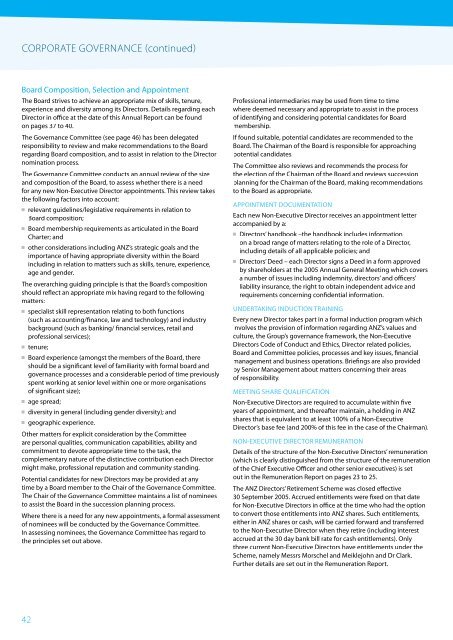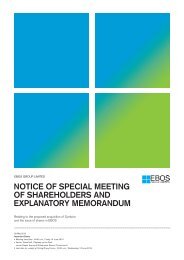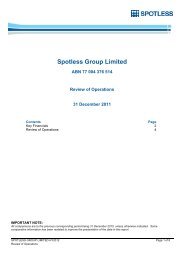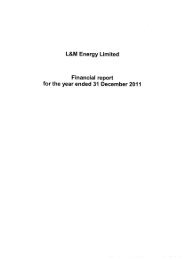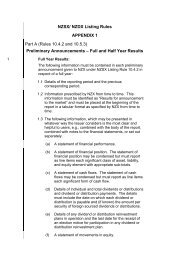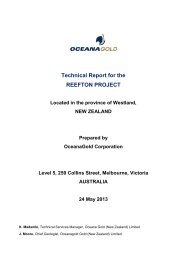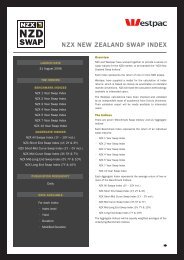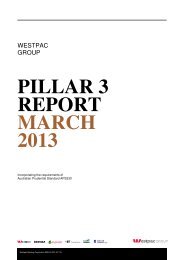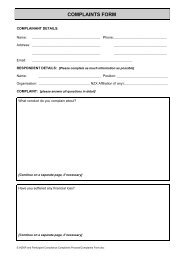2012 Annual Report - Hong Kong Monetary Authority
2012 Annual Report - Hong Kong Monetary Authority
2012 Annual Report - Hong Kong Monetary Authority
You also want an ePaper? Increase the reach of your titles
YUMPU automatically turns print PDFs into web optimized ePapers that Google loves.
CORPORATE GOVERNANCE (continued)<br />
Board Composition, Selection and Appointment<br />
The Board strives to achieve an appropriate mix of skills, tenure,<br />
experience and diversity among its Directors. Details regarding each<br />
Director in office at the date of this <strong>Annual</strong> <strong>Report</strong> can be found<br />
on pages 37 to 40.<br />
The Governance Committee (see page 46) has been delegated<br />
responsibility to review and make recommendations to the Board<br />
regarding Board composition, and to assist in relation to the Director<br />
nomination process.<br />
The Governance Committee conducts an annual review of the size<br />
and composition of the Board, to assess whether there is a need<br />
for any new Non-Executive Director appointments. This review takes<br />
the following factors into account:<br />
relevant guidelines/legislative requirements in relation to<br />
Board composition;<br />
Board membership requirements as articulated in the Board<br />
Charter; and<br />
other considerations including ANZ’s strategic goals and the<br />
importance of having appropriate diversity within the Board<br />
including in relation to matters such as skills, tenure, experience,<br />
age and gender.<br />
The overarching guiding principle is that the Board’s composition<br />
should reflect an appropriate mix having regard to the following<br />
matters:<br />
specialist skill representation relating to both functions<br />
(such as accounting/finance, law and technology) and industry<br />
background (such as banking/ financial services, retail and<br />
professional services);<br />
tenure;<br />
Board experience (amongst the members of the Board, there<br />
should be a significant level of familiarity with formal board and<br />
governance processes and a considerable period of time previously<br />
spent working at senior level within one or more organisations<br />
of significant size);<br />
age spread;<br />
diversity in general (including gender diversity); and<br />
geographic experience.<br />
Other matters for explicit consideration by the Committee<br />
are personal qualities, communication capabilities, ability and<br />
commitment to devote appropriate time to the task, the<br />
complementary nature of the distinctive contribution each Director<br />
might make, professional reputation and community standing.<br />
Potential candidates for new Directors may be provided at any<br />
time by a Board member to the Chair of the Governance Committee.<br />
The Chair of the Governance Committee maintains a list of nominees<br />
to assist the Board in the succession planning process.<br />
Where there is a need for any new appointments, a formal assessment<br />
of nominees will be conducted by the Governance Committee.<br />
In assessing nominees, the Governance Committee has regard to<br />
the principles set out above.<br />
Professional intermediaries may be used from time to time<br />
where deemed necessary and appropriate to assist in the process<br />
of identifying and considering potential candidates for Board<br />
membership.<br />
If found suitable, potential candidates are recommended to the<br />
Board. The Chairman of the Board is responsible for approaching<br />
potential candidates.<br />
The Committee also reviews and recommends the process for<br />
the election of the Chairman of the Board and reviews succession<br />
planning for the Chairman of the Board, making recommendations<br />
to the Board as appropriate.<br />
APPOINTMENT DOCUMENTATION<br />
Each new Non-Executive Director receives an appointment letter<br />
accompanied by a:<br />
Directors’ handbook –the handbook includes information<br />
on a broad range of matters relating to the role of a Director,<br />
including details of all applicable policies; and<br />
Directors’ Deed – each Director signs a Deed in a form approved<br />
by shareholders at the 2005 <strong>Annual</strong> General Meeting which covers<br />
a number of issues including indemnity, directors’ and officers’<br />
liability insurance, the right to obtain independent advice and<br />
requirements concerning confidential information.<br />
UNDERTAKING INDUCTION TRAINING<br />
Every new Director takes part in a formal induction program which<br />
involves the provision of information regarding ANZ’s values and<br />
culture, the Group’s governance framework, the Non-Executive<br />
Directors Code of Conduct and Ethics, Director related policies,<br />
Board and Committee policies, processes and key issues, financial<br />
management and business operations. Briefings are also provided<br />
by Senior Management about matters concerning their areas<br />
of responsibility.<br />
MEETING SHARE QUALIFICATION<br />
Non-Executive Directors are required to accumulate within five<br />
years of appointment, and thereafter maintain, a holding in ANZ<br />
shares that is equivalent to at least 100% of a Non-Executive<br />
Director’s base fee (and 200% of this fee in the case of the Chairman).<br />
NON-EXECUTIVE DIRECTOR REMUNERATION<br />
Details of the structure of the Non-Executive Directors’ remuneration<br />
(which is clearly distinguished from the structure of the remuneration<br />
of the Chief Executive Officer and other senior executives) is set<br />
out in the Remuneration <strong>Report</strong> on pages 23 to 25.<br />
The ANZ Directors’ Retirement Scheme was closed effective<br />
30 September 2005. Accrued entitlements were fixed on that date<br />
for Non-Executive Directors in office at the time who had the option<br />
to convert those entitlements into ANZ shares. Such entitlements,<br />
either in ANZ shares or cash, will be carried forward and transferred<br />
to the Non-Executive Director when they retire (including interest<br />
accrued at the 30 day bank bill rate for cash entitlements). Only<br />
three current Non-Executive Directors have entitlements under the<br />
Scheme, namely Messrs Morschel and Meiklejohn and Dr Clark.<br />
Further details are set out in the Remuneration <strong>Report</strong>.<br />
42


